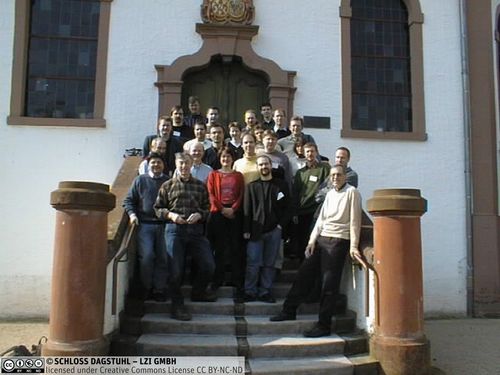Dagstuhl Seminar 02111
Concurrency and Dynamic Behaviour Modelling: Pragmatics & Semantics
( Mar 10 – Mar 15, 2002 )
Permalink
Organizers
- Gregor Engels (Universität Paderborn, DE)
- Ursula Goltz (TU Braunschweig, DE)
- Rob van Glabbeek (Stanford University, US)
Contact
A topic which has gained increasing interest in the past years is the modeling of distributed and concurrent systems. Typical applications are for example in the area of real-time, embedded, and component-based systems, Web-based and multi-agent systems. The complexity of such systems in combination with high demands on their reliability call for adequate design methods.
Concurrency theory provides a formal basis for specifying such systems, consisting of approaches such as process algebra and Petri nets for modeling, logics for expressing properties of concurrent systems, and methods for analysis and verification; Pi-calculus, ambients and control structures provide mobility concepts. Semantic models underlying these concepts were investigated, for example transition systems with various notions of equivalence and event structures. Coalgebras and hidden algebras provide a uniform framework for modeling dynamic behavior and modularization. However, the impact of these developments on practical software development has been limited. One reason is the lack of integration of specification techniques for different aspects of software development, and the missing support for specific application domains and methodologies. Another reason lies in the difficulties of practitioners in reading and writing formal specifications.
Software engineering methods are being developed which specifically address these issues. For example, the Unified Modeling Language (UML) integrates design notations for specifying the logical and physical structure of a system, its dynamic behavior, the interaction with other systems, etc. Being a general-purpose language, the UML provides mechanisms for defining domain-specific profiles of the language. An intuitive diagrammatic notation allows its use by application developers without background in formal methods. However, as UML lacks a formal foundation, models are often ambiguous, and there is no satisfactory support for analysis and verification of models.
The goal of this seminar is to bring together people from both areas of research for the mutual benefit of
- discussing the technology transfer from concurrency theory to (in particular) object-oriented modeling, and
- deriving new challenges for concurrency theory from problems in practical software development.
In particular, we would like the following topics to be addressed:
- Semantics of behavioral models, including problems of under-specified and open systems.
- Consistency between between non-orthogonal sub-models.
- Support for methodologies and specific application domains.
- Adequacy and expressiveness of behavior models, abstraction levels in modeling.
- Analysis and verification (model checking, etc.), code generation.
- Advanced concepts like time and mobility.
The discussion of these and other issues between experts from the research fields outlined above will lead to a better understanding of the semantics of models for dynamic behavior of concurrent systems and of perspectives on further developments both from the theoretic and pragmatic point of view.
- Nasreddine Aoumeur (Universität Magdeburg, DE)
- Jos Baeten (TU Eindhoven, NL)
- Egon Börger (University of Pisa, IT) [dblp]
- Rocco De Nicola (University of Florence, IT) [dblp]
- Jörg Desel (KU Eichstätt-Ingolstadt, DE)
- Karsten Diethers (TU Braunschweig, DE)
- Hans-Dieter Ehrich (TU Braunschweig, DE)
- Gregor Engels (Universität Paderborn, DE) [dblp]
- Ursula Goltz (TU Braunschweig, DE)
- Luuk P.J. Groenewegen (Leiden University, NL)
- Martin Große-Rhode (FhG - ISST Berlin, DE)
- Florian Hacklinger (LMU München, DE)
- David Harel (Weizmann Institute - Rehovot, IL) [dblp]
- Reiko Heckel (University of Leicester, GB) [dblp]
- David N. Jansen (University of Twente, NL) [dblp]
- Sebastian John (TU Berlin, DE)
- Stuart Kent (University of Kent, GB)
- Ruurd Kuiper (TU Eindhoven, NL)
- Jochen M. Küster (Universität Paderborn, DE)
- Diego Latella (CNR - Pisa, IT)
- Erich Mikk (Siemens AG - Erlangen, DE)
- Martin Mutz (TU Braunschweig, DE)
- Ernst-Rüdiger Olderog (Universität Oldenburg, DE) [dblp]
- Wolfgang Reisig (HU Berlin, DE) [dblp]
- Arend Rensink (University of Twente, NL) [dblp]
- Jörn Schneider (Robert Bosch GmbH - Stuttgart, DE) [dblp]
- Ana Sokolova (TU Eindhoven, NL) [dblp]
- Wil van der Aalst (TU Eindhoven, NL) [dblp]
- Rob van Glabbeek (Stanford University, US)
- Louis Van Gool (TU Eindhoven, NL)
- Heike Wehrheim (Universität Oldenburg, DE) [dblp]
- Roel J. Wieringa (University of Twente, NL) [dblp]
- Albert Zündorf (Universität Kassel, DE) [dblp]


